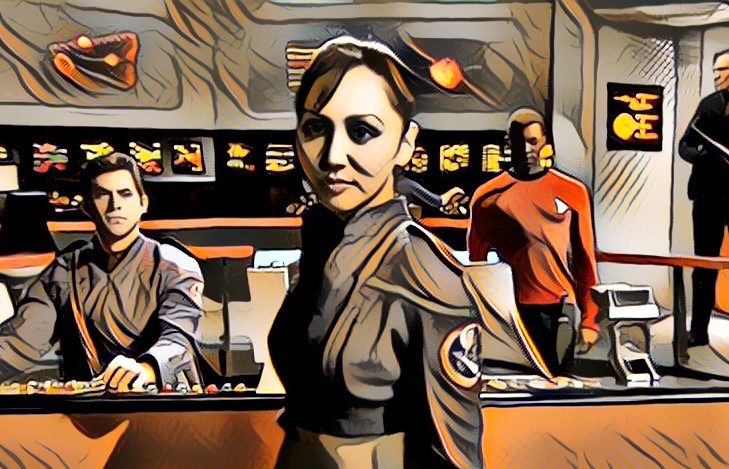*This post contains major spoilers up to and including episode 12 of Star Trek: Discovery’s first season, as well as spoilers for Star Trek: Deep Space Nine’s first three Mirror Universe episodes only, which appear in seasons 2, 3, and 4.
Star Trek: Deep Space Nine – “Shattered Mirror” (season 4, episode 20)
Written by Ira Steven Behr & Hans Beimler; directed by James L. Conway; first aired in 1996
Mirror Jennifer Sisko pops over to the Prime Universe to visit and emotionally scar the son she never had, Jake. Ben Sisko is cautious about this whole weird arrangement, but nowhere near cautious enough, as it turns out, seeing as how Mirror Jennifer takes the first chance she gets to abduct the fawning and much-less-mature-than-usual Jake. She and the other Terran rebels hold Jake as a willing hostage so that Ben will help them finish building their knock-off Defiant, which they’ll need if they’re going to hold the newly-taken Terok Nor against the Klingon-Cardassian Alliance’s approaching fleet. Mirror Jennifer takes a liking to Jake, and eventually comes to her senses about the lasting psychological damage she’s probably doing to him. But on her way to get Jake back to the Prime Universe, she’s gunned down by an also-escaping Intendant Kira, and Ben and Jake must mourn Jennifer once again … sort of.
VS.
Star Trek: Discovery – “Vaulting Ambition” (season 1, episode 12)
Written by Jordon Nardino; directed by Hanelle M. Culpepper; first aired in 2018
In the Mirror Universe, Specialist Burnham takes a shuttle ride from the frying pan into the fire, as she and Captain Lorca leave the ISS Shenzhou to board the ISS Charon, Emperor Georgiou’s palace ship. Lorca is taken away to be tortured while Georgiou first welcomes Burnham back, then feeds her some poor Kelpien, then accuses her of treason. Burnham saves herself from execution by convincing Georgiou that she’s from a different universe, and learns that Mirror Burnham was raised by Georgiou, but was creepily “groomed” and turned against the Emperor by Mirror Lorca. She also learns that the only physiological difference between Terrans and humans is that Terrans’ eyes are more sensitive to light … you know, like Captain Lorca’s. While the threat-ganglia Burnham ate probably goes crazy in her stomach, Stamets is stuck in spore-land with Mirror Stamets, whom he’s warned not to trust by the ghost (or whatever) of the late Dr. Culber.
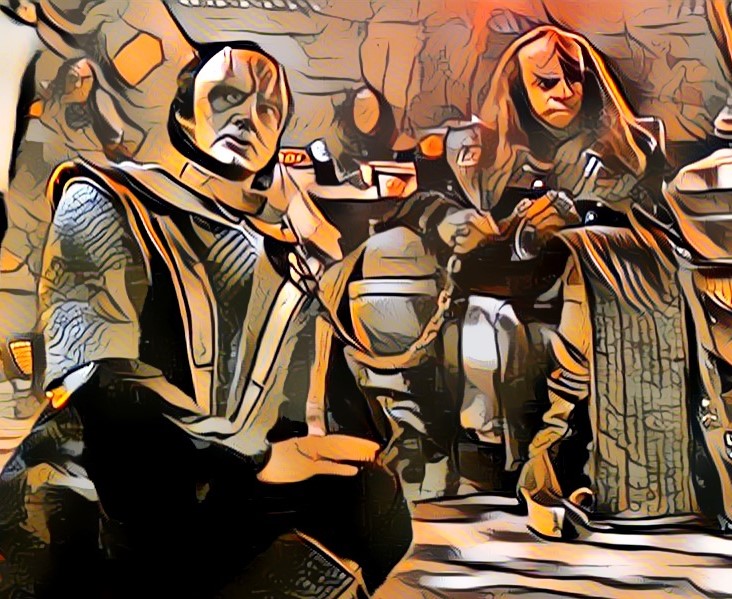
Last time, we saw how Deep Space Nine’s “Through the Looking Glass” began a trend away from theme and emotional realism in Star Trek’s Mirror Universe episodes, focusing instead on the what-if fun of showing us very different duplicates of our main characters, like the sadistic and hedonistic Intendant Kira, or bringing back some of our departed supporting characters, like Jennifer Sisko. We also saw how Discovery finally broke with that trend in episodes like “The Wolf Inside”, which explicitly focuses on how it might feel to find yourself surrounded by dark reflections of your friends and loved ones.
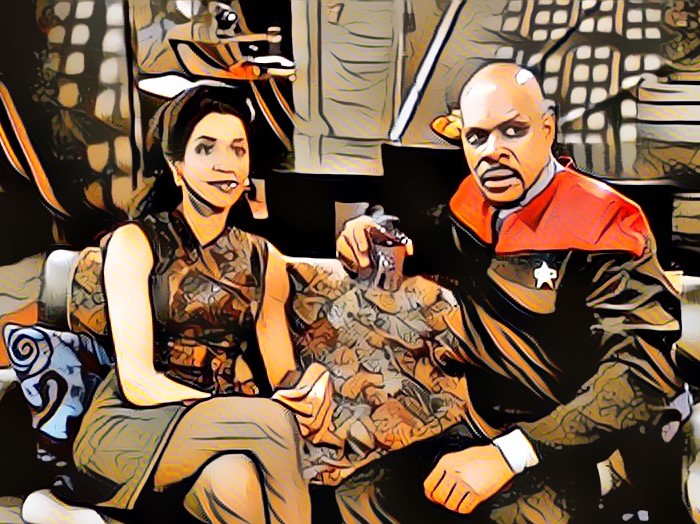
Both “Through the Looking Glass” and “The Wolf Inside” bring back late loved ones of their central characters, reuniting Commander Sisko with his wife Jennifer, and Michael Burnham with her mentor and work mom, Philippa Georgiou. But both Jennifer and Philippa are more than just painful memories for our main characters. Their deaths, each occurring in the pilot episodes of their respective series, determine where Sisko and Burnham start as our main characters, and the direction they’re headed in as each series progresses. (Whether or not this counts as ‘fridging’ is an interesting question, especially in Jennifer’s case, but it’s a question we’ll leave for another time.) Bringing these characters back, then, is – or at least should be – kind of a big deal, and should say something about the series itself. Discovery is fully aware of this, making Emperor Georgiou’s entrance at the end of “The Wolf Inside” a climactic and impactful moment, both for us and for Burnham, and promising more of that emotional and thematic impact in the following episode, “Vaulting Ambition”. DS9, on the other hand, backs away from that big-dealness in “Through the Looking Glass”, spending more time having fun with Sisko’s over-the-top undercover act than exploring the emotional implications of reuniting him with a version of Jennifer. But the Mirror Universe follow-up to that episode, “Shattered Mirror”, would again feature Mirror Jennifer, which must mean that they were going to explore those implications at last, right? … Right?
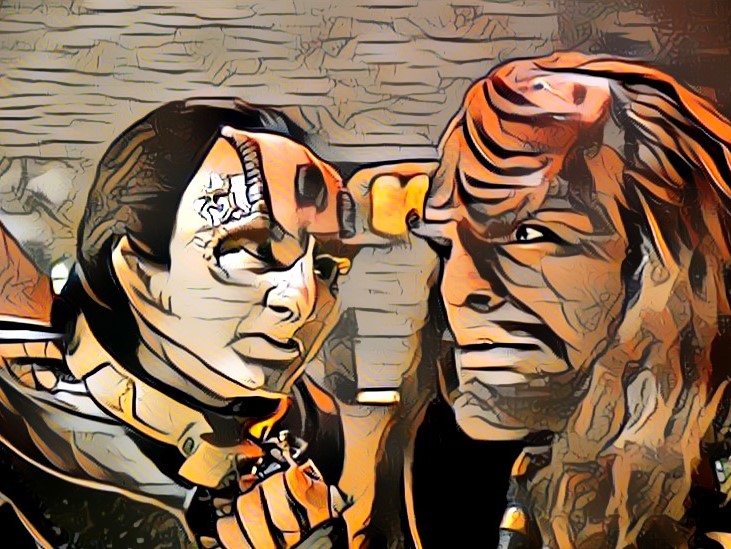
Well, yes and no. “Shattered Mirror” starts off by showing us an emotionally vulnerable Jake Sisko missing his best friend, Nog, who’s away at Starfleet Academy. From there, we follow Jake into his quarters, and into one of the weirdest family situations we could imagine, as he finds his dad in conversation with someone who appears to be his dead mother. This is the dramatic end to the episode’s opening teaser, acknowledging the stakes of the emotional minefield Jake finds himself in, and using those stakes to pull us into the episode. And those emotional stakes continue to be a central part of the episode’s plot, as it’s Jake’s vulnerability to his Mirror mother that allows him not just to be kidnapped, but to actually be happy to spend time with Jennifer in the Mirror Universe, even as he’s used by the Terran rebels to motivate Commander Sisko to help them. Much like in “Through the Looking Glass”, the action-adventure aspects of “Shattered Mirror” soon start taking up most of the episode’s narrative space, with its epic starship battles and fist-pumping “Yeah!” moments, and its comedic interludes from the bridge of the Alliance flagship (which I found myself thinking of as The Worf and Garak Show, since it was so completely irrelevant to the rest of the episode that it felt like changing channels to another show in the middle of this one). But at least the emotional impact of Mirror Jennifer’s presence is an undeniably important plot point in this episode, in a way that it really wasn’t in “Through the Looking Glass”.
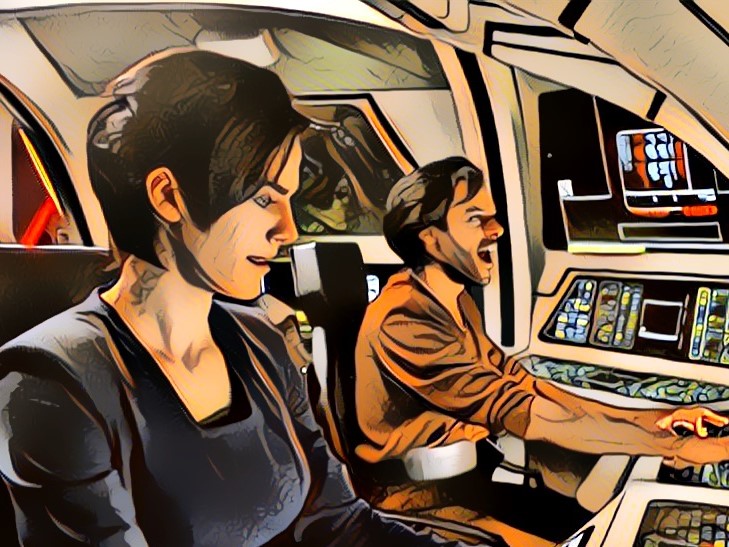
But does “Shattered Mirror” ever allow her appearance in Jake’s life to become more than just a plot device? The episode certainly tries; Ben Sisko is immediately apprehensive when Jake first meets Mirror Jennifer, and Jake’s vulnerability in this situation – and Mirror Jennifer’s pretty horrifying exploitation of that vulnerability – is something Ben brings up repeatedly throughout the episode. Her eventual realization that maybe taking advantage of Jake and kidnapping him “wasn’t such a god idea after all” (!) is an important turning point in the episode, and her death is treated as seriously as it could be in the very brief time it’s given at the end of the episode (and given that the series will pretty much never mention her death again).
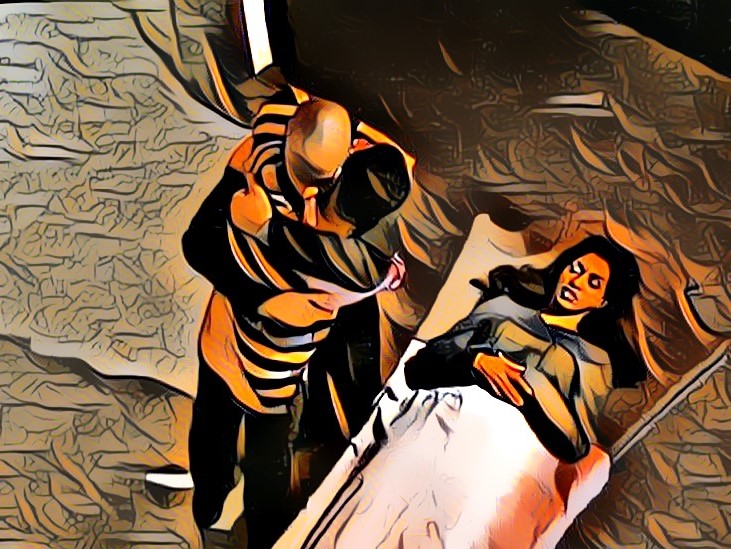
But that’s kind of the problem, isn’t it? The whole Mirror Jennifer storyline is treated as seriously as it could be in an episode that isn’t, in any way, equipped to deal with serious things. As I mentioned last time, it might seem like I’m just being a buzzkill when I criticize the surface-level fun of these Mirror Universe episodes; you might ask why I can’t be content to let the episode just be fun. But bringing the late Jennifer Sisko back into the lives of her loved ones isn’t the sort of thing you put into an episode ‘just for fun’. Her presence in the story automatically brings up serious subject matter, and including her in an otherwise light-and-fluffy Mirror Universe episode was a choice the writers made, twice. She’s not a main character, after all, or even a recurring supporting character like Garak; there would be no contractual obligations to feature her in this episode, and in fact the writers and producers would have had to go out of their way to make sure that Felicia Bell was available to reprise her role as Jennifer Sisko. The show chose to include Mirror Jennifer in a pair of episodes that couldn’t properly deal with her, and I think it’s perfectly reasonable to be critical of that choice.
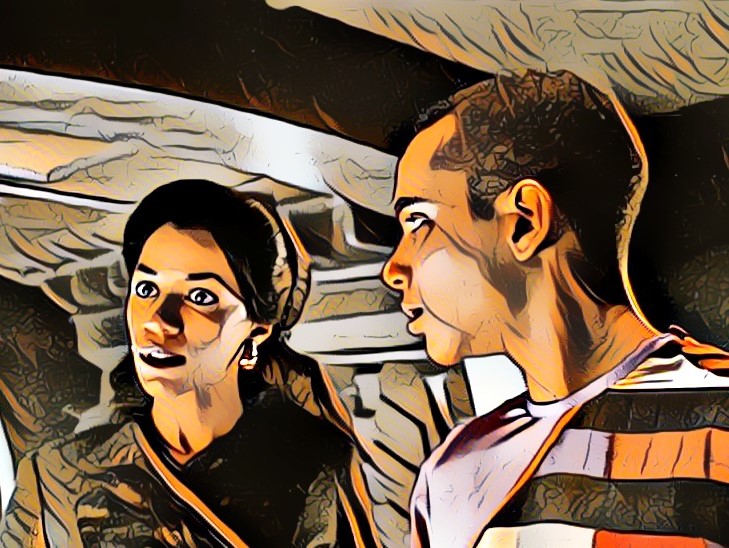
And maybe it’s the dissonance of that choice that makes the tone and content of the Sisko ‘family’ scenes in “Shattered Mirror” feel so … odd. Jake’s reactions to Jennifer throughout the episode seem like those of a much younger child, or of someone much less mature than DS9 has established Jake to be by this point in the series. When he tries to get his dad and sort-of-mom sort-of-back-together – which starts almost immediately after he meets Mirror Jennifer, and continues through much of the episode – it feels like he’s been replaced by an 80s sitcom character. In fact, the ‘family’ dinner scene in Jennifer’s quarters on Terok Nor, when Jake cooks her dinner and brags about his dad’s cooking, and Ben comes home tired from a long day at the Defiant factory … it all feels exactly like something from a decades-old sitcom. Which could be interesting, if it were done intentionally as the B-plot to a normal episode, and if Mirror Jennifer were replaced with Kasidy Yates … you know, Ben’s girlfriend, whose existence Jake seems to have completely forgotten as he tries to set his dad up with someone else. But this sitcom-ish handling of Jake and Jennifer’s relationship, here, is a problem, because it really muddies the waters in terms of how we’re supposed to view Mirror Jennifer’s actions. The episode has her put the plot in motion by doing something really reprehensible: preying on Jake’s feelings about his dead mother in order to kidnap him and use him as collateral, assuming he’s not killed in an Alliance attack in the meantime. And having Mirror Jennifer be reprehensible, or at least be willing to do things she knows are reprehensible for what she sees as the greater good, could be really compelling. But, again, that’s not the sort of thing “Shattered Mirror” is willing or able to deal with, and so the rest of the episode treats Mirror Jennifer like someone who didn’t do something reprehensible just a few minutes ago. This puts the audience in the awkward position of not knowing whether we’re supposed to judge a character by what we’ve actually seen her doing, or by how the show wants us to feel about her.
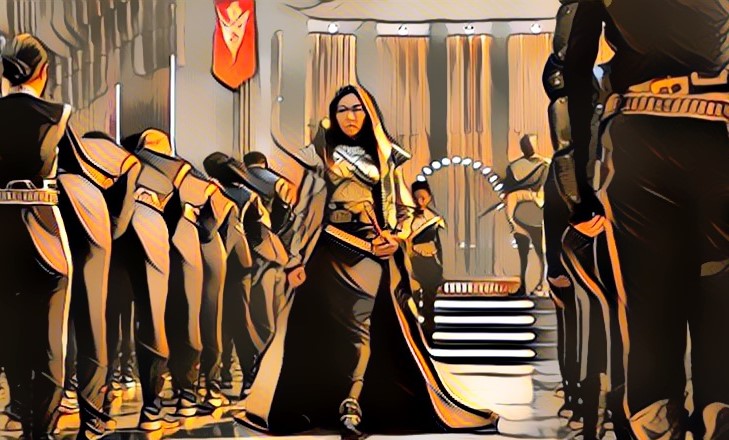
This is not, I think, a problem that Discovery has with its Mirror Universe version of Philippa Georgiou. Emperor Georgiou makes her entrance at the end of “The Wolf Inside” by using her Imperial flagship to decimate a planet, killing a whole bunch of people, and “Vaulting Ambition” pretty much carries on from there; one of the first things we see her do in this episode is sentence Captain Lorca to a “long life” of constant torture. If we think we’re seeing a kinder side to her when she welcomes Michael Burnham back as her daughter, our illusions are quickly crushed when she brags about how well her palace chefs prepared the enslaved Kelpien that Burnham unwittingly chose to be their dinner. That domestic dinner scene is impressively tense, and suffers from none of the dissonance of the Sisko family’s backdoor sitcom pilot. Michelle Yeoh plays Emperor Georgiou as consistently terrifying, even when she’s trying to be nice, and the sight of her holding out the Kelpien’s threat-ganglia for Burnham to eat is the stuff of nightmares and horror movies. And Sonequa Martin-Green keeps us well aware, throughout, of the emotions she’s holding in check behind her attempt to blend in: the despair of seeing what this Georgiou is, the fear of what she might do, and the revulsion of finding out not only that she just cannibalized a sentient humanoid, but that she herself chose which Kelpien’s threat-ganglia would wind up between the Emperor’s chopsticks.
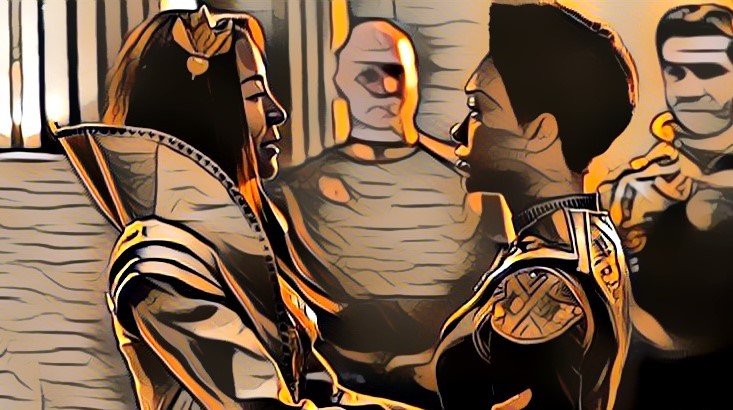
“Vaulting Ambition” is able to walk that tonal line more effectively than “Shattered Mirror” because that’s what “Vaulting Ambition”, and Discovery’s entire Mirror Universe storyline, was designed to do. Encounters with scary Mirror versions of dead loved ones, and the questions raised by those encounters, weren’t crammed into this episode because they sounded like a cool idea, or because they solved a plot problem; they are very much the point of this episode, and, I think, of including the Mirror Universe in Discovery’s first season in the first place. The season began with Burnham choosing pragmatism over Starfleet ideals in “The Vulcan Hello”, and choosing revenge over those ideals (and even over pragmatism) in “Battle at the Binary Stars”. In those episodes, Captain Georgiou served not only as a mother figure to Burnham, but as the Platonic ideal of a Starfleet officer: cultured, confident, and compassionate. She wasn’t just committed to the ideals of the Federation, she practically embodied them. However much blame Burnham actually deserved for her actions in those episodes, she was certainly left feeling that she’d turned her back on the best parts of Starfleet, and that Georgiou’s death, the Federation-Klingon War, and Burnham’s own fall from grace were the results of that betrayal. Since then, the season has repeatedly concerned itself with the question of how far one can go to preserve society without betraying the ideals that society is based on, and the Terran Empire serves as the extreme but logical endpoint to the line of reasoning that Burnham embraced in “The Vulcan Hello”, and which Lorca had been encouraging her to double down on since she joined his crew. It’s easy to imagine Burnham torturing herself with the idea that her confrontation with this nightmare version of Philippa Georgiou is some kind of karmic punishment for her actions at the beginning of the season: “Logic tells me she’s not the woman that I betrayed,” Burnham says to Lorca, “but this feels like a reckoning.” But setting notions of punishment aside, I think Emperor Georgiou is meant to show us, and Burnham, that anyone can end up as something horrible if they fully accept that the ends justify the means (after all, what is the Terran Empire, if not a society in which no one ever even asks if the ends justify the means?).
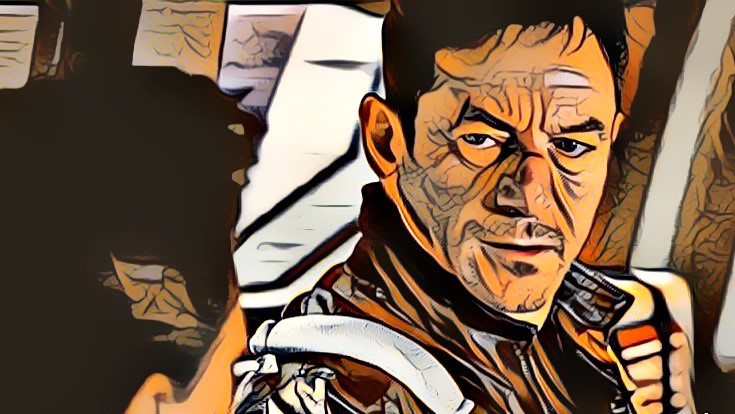
Burnham’s “reckoning” with Emperor Georgiou, then, serves as foreshadowing for the real reckoning that begins at the end of this episode, one that’s been coming since Burnham joined Lorca’s crew, in the season’s third episode: Burnham’s realization – and that of the entire crew of the Discovery, as we’ll see in the next episode – that Captain Lorca was Mirror Lorca all along. But this reckoning is more than just a plot twist. It’s the realization not just that Lorca himself was always a fraud, but that his way of doing things was always a fraud, too; that the ends never justified questionable means, and that Lorca himself never cared either way. Like most powerful people who tell us that you have to break a few eggs to make an omelette, the only thing Lorca ever cared about was the fact that he, himself, was hungry for an omelette; the idea that the ends justify the means is mostly just a trick that’s been played on us by the people who stand to benefit most from whatever the ends are. As we might have suspected back when Lorca first said it, his declaration that “universal law is for lackeys, context is for kings” only ever meant that the “kings” should be able to do whatever they want, an idea which powerful people in the real world love to present to us as novel and revolutionary, when in fact it’s one of the oldest, dullest, dumbest ideas humans have ever had.
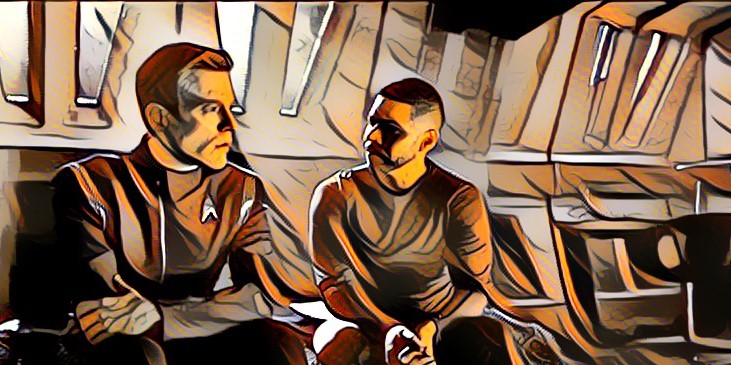
And so “Vaulting Ambition” capitalizes on the ongoing themes and storylines of Discovery’s first season to make full use of its ‘dark reflection of a loved one’ premise, in a way that it might have been interesting to see DS9 do with Mirror Jennifer. But “Vaulting Ambition” also improves on “Shattered Mirror’s” attempt at reuniting a family separated by death, by separating that premise from the Mirror Loved One premise, and allowing it to play out with a separate set of characters (something that the brisk action-adventure plot of “Shattered Mirror” simply didn’t allow time for, an advantage of Discovery’s more serialized format). As I’ve written already, I think Dr. Culber’s death was by far the biggest misstep of Discovery’s first season, and the scene between him and Stamets here isn’t quite enough to change my mind. Having said that, though, their reunion – even if it does take place in the Mycelial Forest, or Spore Heaven, or wherever they are, exactly – is everything the Siskos’ ‘reunion’ with Mirror Jennifer couldn’t be. The scene between them is genuinely touching, thanks in large part, I think, to its call-back to their ‘toothbrush scene’ from earlier in the season. That imagery – the two of them discussing their day while they go through their comfortingly mundane domestic routine – was quietly revolutionary when we first saw it, and was one of the very few times that Trek has done a good job of showing us a genuinely caring, functional, adult romantic relationship between any two characters, period. The connection we see between them in this episode, even if it is frustratingly short-lived, is a far cry from the sitcom family dynamics of “Shattered Mirror”. Their scene in “Vaulting Ambition” is as believable as it can be under the sci-fi circumstances, and is very well played by both Wilson Cruz and Anthony Rapp; but more than that, it serves as a touching counter-example to what we see in this episode from Emperor Georgiou, and from Lorca. These are two people who genuinely, selflessly care about each other’s well-being, and that connection built on love and empathy may help to save all of the Discovery crew from the mess Lorca’s utter lack of empathy has gotten them into.
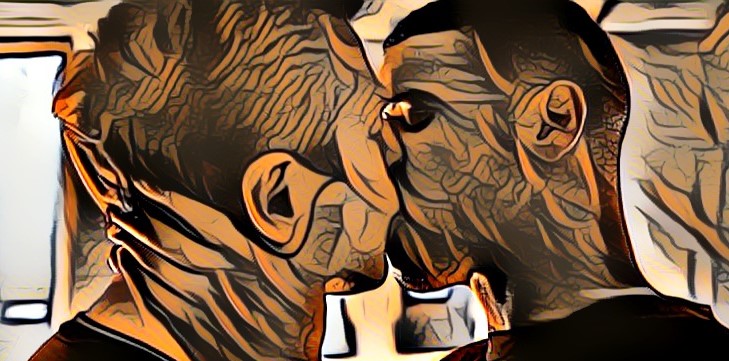
Next time, we’ll finish off our look into the Mirror Universe by returning to Enterprise’s “In a Mirror, Darkly”, and comparing Part 2 of that episode to the conclusion of Discovery’s first-season Mirror Universe arc, “What’s Past is Prologue”!
